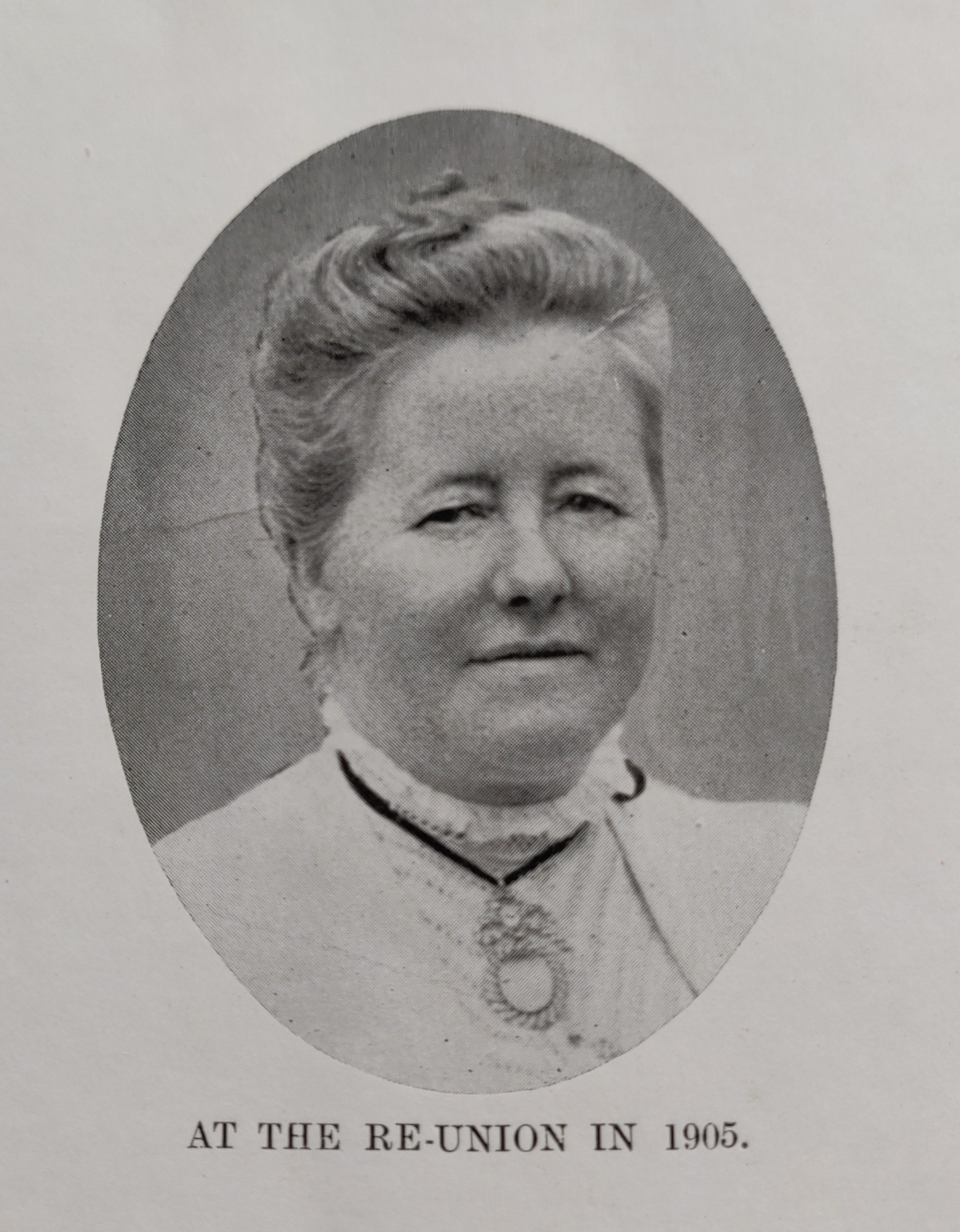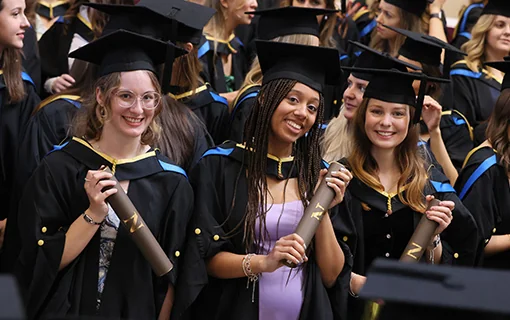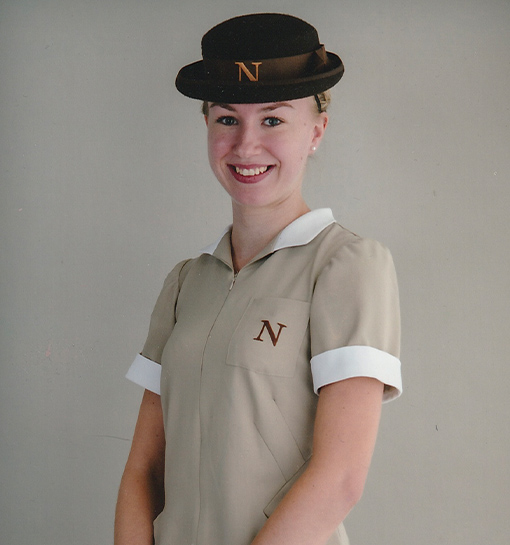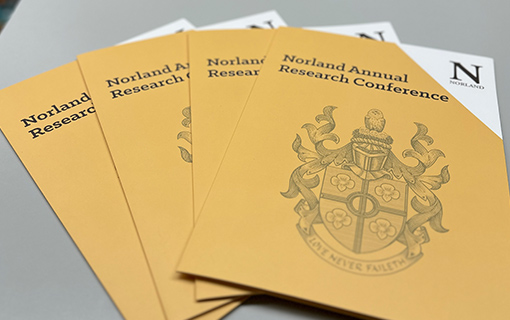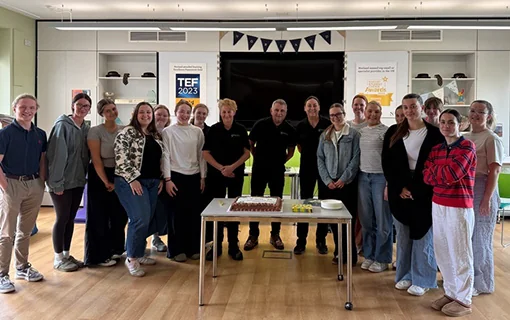The history of Norland in 13 objects: a portrait of Emily Ward aged seven
27 January 2022

The first object in our series celebrating the 130-year history of Norland through 13 objects, one for each pioneering decade, is a portrait of our founder as a child.
We’re starting at the very beginning with this object from our archives. It is the image of a seven-year-old girl who would go on to become a pioneer in early years education.
Mrs Emily Jane Ward (née Lord) was born in Derby on 13 August 1850 to a wealthy family and grew up in south west London. Her early education was provided by a governess, and she was later educated at a boarding school in central London. In her early twenties, she became an infant teacher at Notting Hill High School.
Reminiscing about her own childhood in a letter to one of her colleagues, she wrote: “… the memory of thousands of things were learnt by observation, and not reading… this may help you to hammer into your students’ heads that some of the most precious memories we have, we learn in our childhood by observation, before we attained the age of eight.”
Two early inspirations influenced her thinking and marked her work. The first was the progressive theories of eminent German educationalist Friedrich Froebel, on whose philosophy she based most of her teaching and later work. The second was the educational value of handcraft of the Sloyd Institute in Sweden.
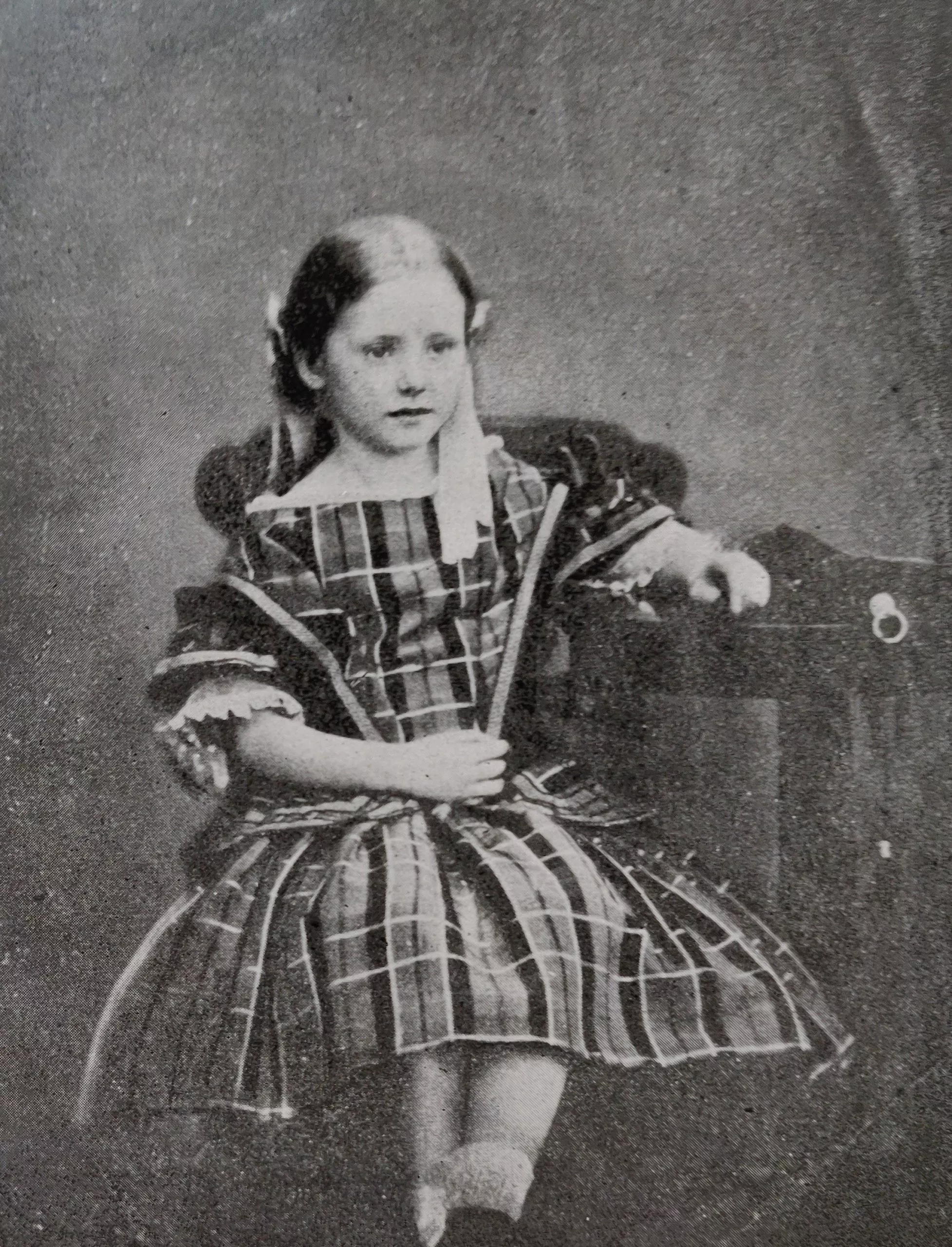
“… the memory of thousands of things were learnt by observation, and not reading… some of the most precious memories we have, we learn in our childhood by observation, before we attained the age of eight.”
In 1874, Emily Ward attended a preliminary meeting for the purpose of forming a Kindergarten Association and was enrolled as a founding member of the Froebel Society. She was then described as “a bright young form-mistress who took profound interest in the new teaching” and attended lectures in London and spent a summer in Geneva studying under one of Froebel’s most prominent disciples Madame du Portugal. By 1881, Emily was a Froebel Society lecturer and a member of its committee. By 1900, she was president of the society.
Her educational career began when she was a first form mistress at the Notting Hill High School, where her understanding of babies led her to suggest to headmistress Miss H M Jones, that she should start a separate establishment where young children could be given an atmosphere more fitted to their needs and should pass into the High School when ready to enter a more formal curriculum.
Emily’s ambition was to open a school dedicated to the education of young children, at a time when society’s focus was firmly fixed on secondary education. In 1876, at the age of 26, she founded the Norland Place School exclusively for the education of children aged 3-8 years. The school opened with five children and developed into a large and successful school. It received a first-class commendation from the Froebel Society in 1879.
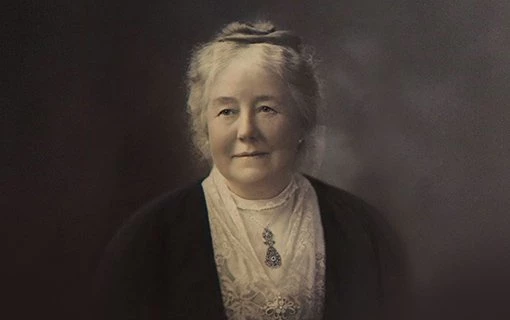
“Our firm conviction that the care of little children is educational work, and that those that undertake it devote themselves to no mean task but may be classed as powerful agents in the state, as character builders….”
In 1882, Emily embarked on her initial scheme for training nursery nurses on Froebelian principles. However, the scheme was abandoned due to financial constraints and the lack of support from her friends in the educational world. She noted that they “were bound up with the noble work of higher education of women, then occupying the minds of all thinking people and my suggestions were looked upon as retrograde to their highest hopes. I therefore put by my scheme and bided my time.” (First Report of the Norland Institute, 1895).
Emily Ward knew that the long-term success of her revolutionary idea relied on the support of a few key society figures. In the summer and autumn of 1892, she held a series of ‘drawing room meetings’ attended by the influencers of the day including eminent headmistresses such as the legendary Miss Buss of Cheltenham Ladies’ College. The meetings drew a high level of press interest with mostly positive articles in The Sunday Times, The Lady, the Daily Chronicle, the Manchester Guardian, Queen and St James’s Gazette. In her notebook, Emily meticulously noted the names of ‘associates’ who were willing to provide student accommodation, lend their skills in training or provide funding to students unable to pay the fees. She also collected an impressive waiting list of clients who were anxious to employ the first graduates.
On 25 September 1892, Emily established the Training School for Ladies as Children’s Nurses, later to be called the Norland Institute, at 9 Norland Place in London. In so doing, she recognised the need for early years childcare to be more structured, centred around the child, loving and nurturing. A radical idea at the time. Prior to the introduction of formal training at Norland, children would be cared for by ‘untutored’ housemaids. With the establishment of the world’s first formal training centre for nursery nurses, Emily created the profession of the trained nursery nurse and the training model on which all future nursery nurse training would be based.
“Some considered it retrograde, whilst others thought that we should have difficulty in persuading girls, who had received High School education, to take up what they called ‘menial work’. I must, however, acknowledge that some have since fully recognised the value and importance of careful nursery training, as foundation for the further development of the child at school.” (First Report of the Norland Institute, 1895).
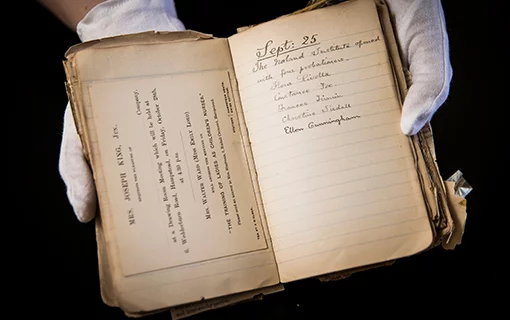
“I look forward confidently and hopefully to the time when a nursery nurse will command from the public the same amount of affection, respect, and trust as is now universally accorded to the hospital nurse and the trained teacher.”
In her address at the Institute’s fourth badge presentation ceremony in June 1911, Emily Ward noted the two objectives of the Norland Institute. “1st. To provide a new opening for girls and women of the educated classes. 2nd. To show that the care of little children and nursery work was not primarily menial but educational.”
She added “the nursery is a place for the all-round development of the little child… not merely a place for ‘marking time’… and that “the parents and nurse should together unite in the promotion of this all-round development, exercising the child’s physical power and watching over its health…. [t]raining its powers of observation and manual dexterity… [and] Promoting an atmosphere of love, joy, and peace, and by loving means… to practice self-discipline and self-control… for self-discipline has an educational value, while enforced discipline has comparatively speaking none.” She then cited Froebel: “Play is the little child’s work” and “To do is better than to know”. (Norland Quarterly, July 1911).
Founding staff member Mildred Hastings worked closely with Emily Ward in the establishment of the Institute. In the published obituary of Emily M J Ward in 1930, Mildred notes that “Mrs Ward gave herself whole-heartedly to the work of building up the Institute. In the early days she was there every day, often giving courses of lectures, working out menus in the kitchen, criticising the cookery, and going the rounds of the house to see that the work in every department was thorough.”
The emphasis was very much focused on the educational role of the nursery nurse. In the March 1905 Norland Quarterly, Emily Ward wrote “our firm conviction that the care of little children is educational work, and that those that undertake it devote themselves to no mean task but may be classed as powerful agents in the state, as character builders….”. In the November 1918 Norland Quarterly, she stated: “The Norland Institute must aim at an all round education for its students, and through them for the children under their care and influence.”
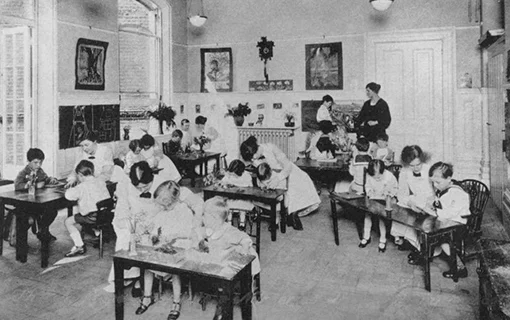
“I must, however, acknowledge that some have since fully recognised the value and importance of careful nursery training, as foundation for the further development of the child at school.”
Emily Ward’s lifelong aspiration was to raise the status of the nursery nurse. “I look forward confidently and hopefully to the time when a nursery nurse will command from the public the same amount of affection, respect, and trust as is now universally accorded to the hospital nurse and the trained teacher.” (Norland Quarterly, March 1899).
In 1899, Emily Ward set out her ideal nurse in the nursery nurse paragon. “Educated up to the age of fourteen… having received elementary domestic training in a good home…. As young girl, she has been employed to play with and amuse the children. By the time she is twenty-one she has … been trained in the school of experience… acquired a gentle, pleasing, respectful, and dignified manner. Well drilled to attend to the physical wants of the children… honest., loyal, and truthful, the picture of our paragon is complete.” (Norland Quarterly, June 1899).
Under Emily’s long leadership, Norland grew and flourished. Norland nursery nurses were quickly in high demand and have remained so for 130 years. Norland training later became the foundation for what was to be called the Nursery Nurse qualification or NNEB, one of the precursors for the modern-day early years educator qualification and still recognised today.
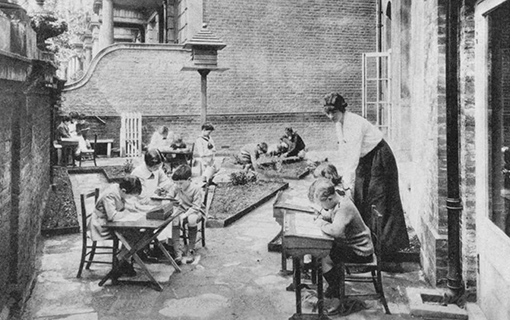
“…that nursery work is not menial and domestic, but educational… that habits, thoughts, ideals formed in the nursery, are formed for life.”
Reflecting in the Norland Quarterly in 1911, Emily Ward wrote: “…the Norland Institute, with all its mistakes and failures, has stood to me for an ideal, indeed, for many ideals such as the improvement of nursery-life as the true basis of family-life… that nursery work is not menial and domestic, but educational… that habits, thoughts, ideals formed in the nursery, are formed for life.”
Emily Ward died on 15 June 1930. Today, Norland stands testament to her radical vision. Synonymous with excellence in childcare and with a worldwide reputation, Norland remains at the forefront of childcare training and higher education. Today’s students study for a BA (Hons) degree in Early Years Development and Learning alongside the practical Norland diploma over four years full-time. As a degree-awarding higher education provider, Norland continues to promote the importance of outstanding education and training in order to produce the very best professional early years practitioners. Fully qualified Norlanders, or Norland Nannies as today’s graduates are known, are employed worldwide through the Norland Agency as nannies and maternity nurses. They enjoy 100% guaranteed employment opportunities and command the highest salaries in the industry.
